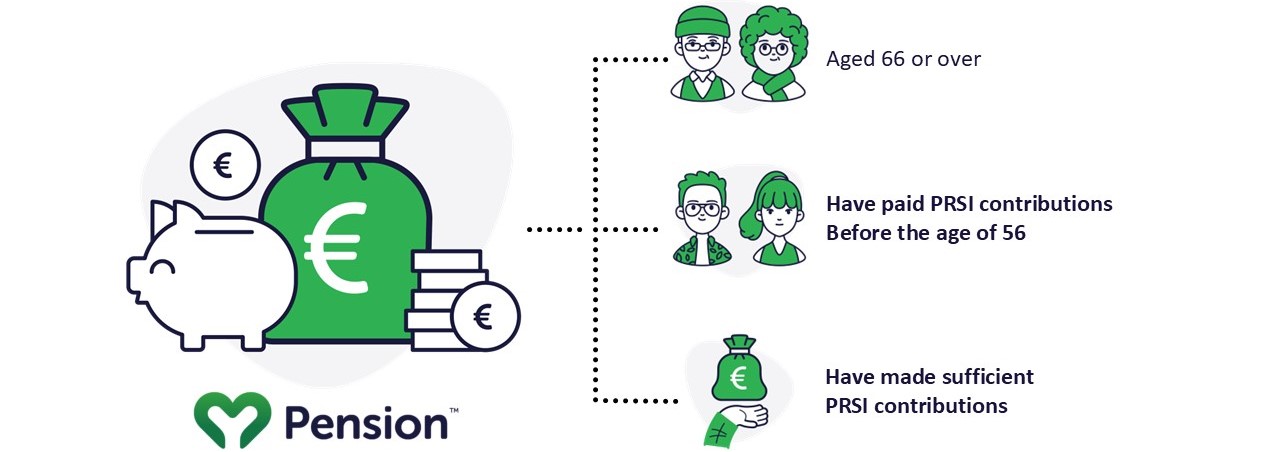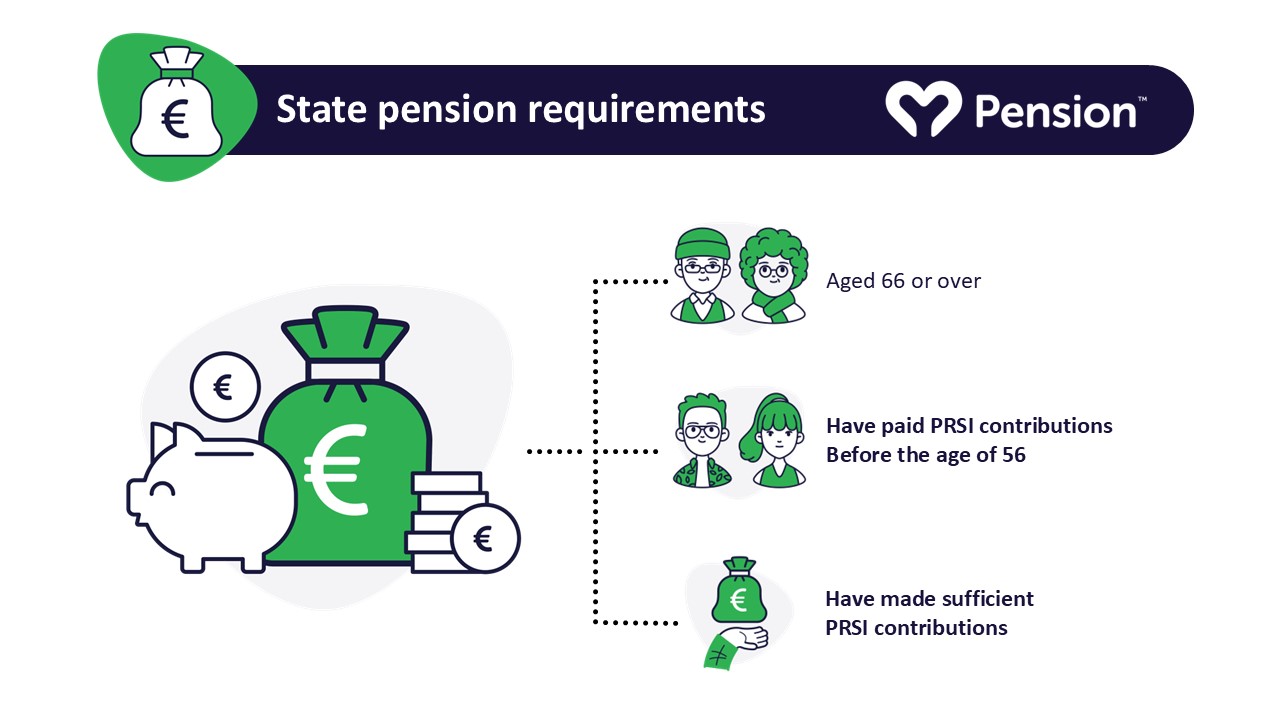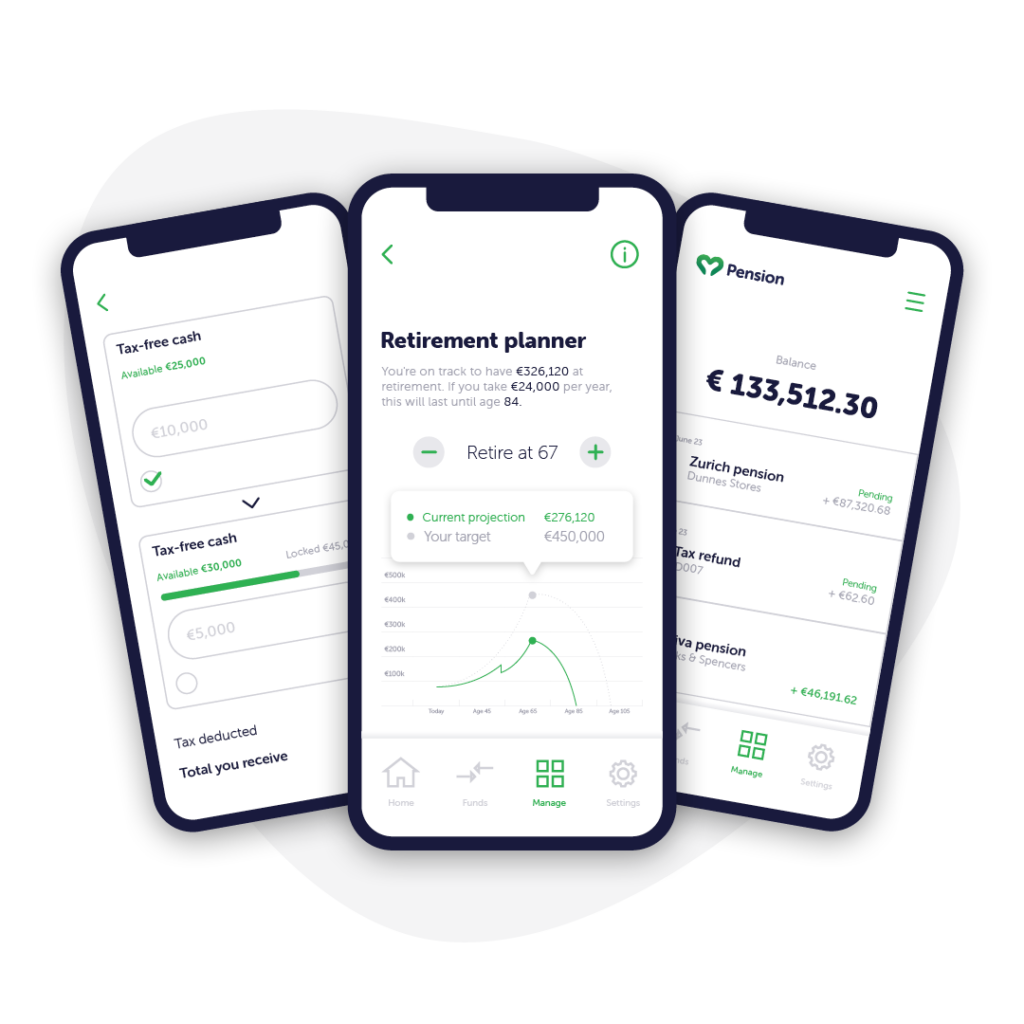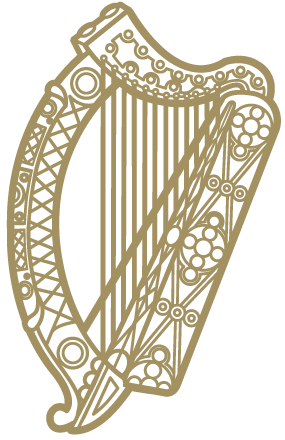State Pension in Ireland – 2025
Find out more about the Irish State Pension scheme. Understand eligibility criteria, contributions, and pay-outs. Equip yourself for future planning.

What’s in this guide?
What is the state pension?
How much is the state pension in Ireland?
Who is entitled to a state pension in Ireland?
When can I claim my State Pension?
How do the contributions work for State Pension?
How can I claim my State Pension?
Calculate my state pension
Useful Links / Documents
Common Questions about the State Pension in Ireland (FAQ)
What is the state pension?
You can begin receiving the State Pension (Contributory) at the age of 66 provided you have accumulated a sufficient number of social insurance (PRSI) contributions. It’s sometimes referred to as the old-age pension. State Pension (Contributory) is not subject to means testing and is accessible even if you have alternative income streams, such as an occupational pension.
Given the intricate nature of the social insurance (PRSI) requirements, it is advisable to submit an application for the State Pension (Contributory) if you have had employment in Ireland and have made PRSI contributions (stamps) at any point.
If you opt for early retirement, it is advisable to maintain your PRSI contributions or ensure eligibility for credited contributions. This can help you receiving a contributory pension once you reach pension age.
How much is the state pension in Ireland?
State Pension (Contributory) – 2025 Rates
From January 2025, the maximum personal rate of the State Pension (Contributory) has increased to €289.30 per week for those under 80, up by €12 compared to 2024. This works out at about €15,031 per year or roughly €41.34 per day.
For pensioners aged 80 and above, the weekly payment is slightly higher at €299.30, which equates to around €15,566 annually or €42.76 per day.
Quick Overview
| Pensioner Age | Weekly Rate | Annual Equivalent | Daily Equivalent |
|---|---|---|---|
| Under 80 | €289.30 | ≈ €15,031 | ≈ €41.34 |
| 80+ | €299.30 | ≈ €15,566 | ≈ €42.76 |
Who is entitled to a state pension in Ireland?
To be eligible for a State Pension (Contributory) in Ireland, you must meet specific criteria. You must be aged 66 or above and have accumulated sufficient Class A, E, F, G, H, N, or S social insurance contributions (PRSI), commonly referred to as full-rate PRSI contributions. Additionally, you must have commenced employment prior to turning 56 and have a minimum of 520 paid contribution weeks since commencing your employment.

When can I claim my State Pension?
You can begin receiving the State Pension (Contributory) at the age of 66 provided you have accumulated a sufficient number of social insurance (PRSI) contributions.
How do the contributions work for State Pension?
To be eligible for a State Pension (Contributory) in Ireland, certain contribution requirements must be met. Specifically, you must have a minimum of 520 paid contributions, or 10 years of contributions, from the year of your initial insurance enrolment up to the conclusion of the tax year before reaching pension age. Among these contributions, at least 260 must be compulsory payments, while the remaining 260 may consist of voluntary contributions. Additionally, you have the option to enhance your State Pension (Contributory) rate by including credited contributions or accounting for caregiving activities for periods less than 20 years.
To qualify for a state pension (contributory) at the age of 66, you must have entered insurable employment prior to reaching the age of 56 years.
Your social insurance record in Ireland, including contributions and any credits received, can be viewed on your Contribution Statement. This statement serves as a comprehensive summary of your social insurance history.
How can I claim my State Pension?
When applying for the State Pension (Contributory), it’s advised to submit your application no more than 6 months before your intended claim start date. In case of a late application, the pension start date can only be backdated by a maximum of 6 months.
The Department of Social Protection has introduced a revised application form for State Pension (Contributory).. This form requires applicants to specify the desired start date for receiving the pension. This date can be chosen from the individual’s 66th birthday or any date falling between their 66th and 70th birthdays.
Calculate my state pension
To assist in estimating the rate of State Pension (Contributory), you can request a copy of your Contribution Statement.
Your Contribution Statement serves as a comprehensive overview of your pay-related social insurance (PRSI) record contributions in Ireland. When determining your State Pension (Contributory) rate, the department utilises your Contribution Statement to assess:
- Your employment history.
- Periods during which you received payments from the Department of Social Protection.
- Time devoted to caregiving.
Your Contribution Statement is segmented into various columns, listed below:
- Year (Column 1): Indicates the relevant year.
- Paid Contributions (Column 2): Details your paid contributions provided by your employer or any self-employment contributions for each relevant year.
- Credited contributions (Column 3): Specifies credited contributions linked to any social welfare payments you received.
- Long-Term Carers Contributions (Column 4): Displays contributions for approved periods of full-time care for an incapacitated person. You need to accumulate a total of 1040 periods/weeks (equivalent to 20 years) of care in this column before they can be utilised in Column 5.
- Reckonable Contributions for Pension (Column 5): Lists contributions countable towards the State Pension (Contributory).
- Reckonable Credited Contributions for Pension (Column 6): Includes details of credited contributions that may count towards the State Pension (Contributory).
- Total Reckonable Contributions and Credited Contributions (Column 7): Provides a cumulative figure of your reckonable contributions and reckonable credits.
To calculate your State Pension (Contributory), the department will consider all contributions recorded up to your chosen pension drawdown date.
Useful Links / Documents

Pension Calculator
Find out your likely retirement income.

State Pension Forecast
Find out your current State Pension Forecast.
Common Questions about the State Pension in Ireland (FAQ)
Is state pension taxable?
If you are 65 or over, you do not have to pay income tax if your income is below a certain amount referred to as the exemption limit.
Exemption limits:
| Single, widowed or surviving civil partner | €18,000 |
| Married or in a civil partnership | €36,000 |
The exemption is for income tax only. It does not apply to Pay Related Social Insurance (PRSI) or Universal Social Charge (USC).
If you or your spouse or civil partner are over 65 years of age, you can get the Age Tax Credit:
| Single, widowed or surviving civil partner | €245 |
| Married or in a civil partnership | €490 |
The State Pension is taxable as income, however, if you receive the maximum state pension of €14,352.00, have no other earnings and qualify for the above exemptions, you should have no tax liability on your State Pension.
Note:
State pensions are not liable to USC or PRSI.
Can you claim benefits if you take early retirement?
Yes, in Ireland, you may be eligible for certain social welfare benefits if you opt for early retirement. These benefits include Jobseeker’s Benefit and Jobseeker’s Allowance. Additionally, there are opportunities to participate in back-to-work and education schemes aimed at supporting individuals re-entering the workforce.
Furthermore, upon reaching the qualifying age, early retirees may also become eligible for the State Pension.
Do teachers get state pensions as well?
If you began employment as a teacher prior to April 6th, 1995, you do not qualify for the State pension. Instead, your pension is fully funded by the Department of Education. However, for those who commenced employment after April 6th, 1995, or returned from a career break after that date, the situation differs slightly.
Teachers falling into the latter category are eligible for a ‘coordinated pension’ upon reaching retirement age at 66. This entails receiving a reduced occupational pension supplemented by the State Pension.
Applicants in this group may qualify for the pension due to their payment of PRSI contributions at the higher A rate.
If a teacher chooses to retire before reaching the age of 66, the Department of Education will provide additional payments to bridge any income gap. These supplementary payments cease once the individual reaches the age of 66.
What is an occupational pension?
An occupational pension, also referred to as a workplace or employers’ pension plan, is a retirement benefit provided by an employer. These pension schemes offer a consistent income stream following retirement, thereby ensuring financial stability during the post-employment phase. Additionally, some occupational pension schemes may include provisions for a lump sum payment upon retirement, providing further financial support to retirees.
Who gets my state pension when I die?
In Ireland, the State Pension typically ceases upon the recipient’s death. However, there may be provisions for a spouse or civil partner to inherit a portion of it, dependant on the National Insurance contributions made by both parties. For instance, if the pensioner passes away before reaching State Pension retirement age, their spouse might be eligible to inherit a segment of the Additional State Pension, provided that the marriage or civil partnership commenced prior to April 6, 2016.
Can I still claim the state pension if I live abroad?
Indeed, individuals living abroad can still claim the state pension in Ireland, provided they have accumulated sufficient National Insurance contributions to meet the eligibility criteria. It’s possible to apply for the contributory pension while residing abroad, with applications accepted up to six months prior to reaching the age of 66. Importantly, this pension is not means-tested, allowing recipients to have additional income from sources like personal or occupational pensions without affecting eligibility. However, similar to other forms of income, the state pension is subject to taxation.
Can I claim state pension and still work in Ireland?
Yes. The State Pension (Contributory) is a payment based on PRSI contributions and is available to individuals from the age of 66 onwards. Importantly, it is not means-tested, meaning eligibility is not determined by one’s financial situation. Recipients of the State Pension (Contributory) can continue to work or receive other forms of income, such as an occupational pension, without impacting their entitlement to the pension.
Take control of your retirement, with MyPension

View all your pensions in one place. MyPension allows you to easily manage your pensions, with features such as combining, contributing and making withdrawals. Your pension, in the palm of your hands.
Cathedral Financial Consultants Ltd t/a My Pension is regulated by the Central Bank of Ireland. With pension investments, your funds might fluctuate in line with investment market movements.
Client services
© Copyright 2024 Cathedral Financial Consultants Ltd t/a My Pension. Registered in Ireland No: 369995.

